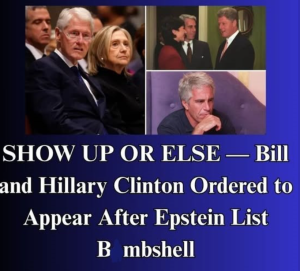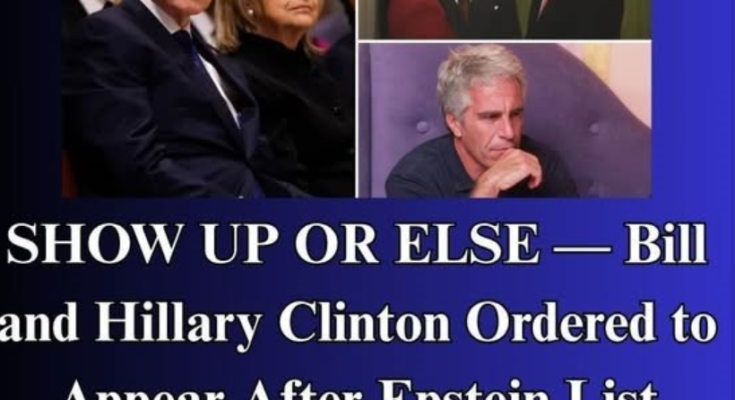Chairman James Comer’s subpoenas in the Epstein investigation, blending factual clarity and political context:
On August 5, 2025, House Oversight and Government Reform Committee Chairman Rep. James Comer (R-Ky.) issued a slew of subpoenas tied to the federal investigation of Jeffrey Epstein and his associate Ghislaine Maxwell. These subpoenas aimed to obtain both documents from the U.S. Department of Justice (DOJ) and depositions from a roster of high-profile political figures and former officials
DOJ Documents
Comer demanded that the DOJ turn over all records and communications pertaining to the investigations of Epstein and Maxwell—including files relating to their respective court cases—by August 19, 2025
Subpoenaed Individuals & Scheduled Depositons
Comer’s subpoenas target a wide range of former government leaders. Here are the names and deposition deadlines he announced:
-
Bill Clinton (former President) – deposition by October 14
-
Hillary Clinton (former Secretary of State) – deposition by October 9
-
Former Attorneys General:
-
William Barr – by August 18
-
Alberto Gonzales – by August 26
-
Jeff Sessions – by August 28
-
Loretta Lynch – by September 9
-
Eric Holder – by September 30
-
Merrick Garland – by October 2
-
-
Former FBI Directors:
-
Robert Mueller – by September 2
-
James Comey – by October 7
-
Scope and Origins of the Subpoenas
The push for these subpoenas followed a July 23, 2025 voice-vote by the House Oversight Subcommittee on Federal Law Enforcement. The motion, led by Rep. Scott Perry (R-Pa.), directed Comer to issue subpoenas to the above individuals. A bipartisan amendment by Rep. Summer Lee (D-Pa.) added the request for DOJ records. Additional amendments—such as including communications involving the Biden administration while protecting victims’ privacy—were also adopted unanimously
Why the Clash Matters
Expanding the Investigation
According to ABC News, the subpoena push stemmed from mounting public pressure and bipartisan concerns over the handling of Epstein’s case—particularly related to high-profile associations
Bipartisan Political Dynamics
Both The Guardian and People highlight that this broad subpoena list—including the Clintons, several AGs, and FBI leaders—represents an unusual congressional reach into the uppermost tiers of political life. Notably, former President Bill Clinton is only the third ex-president ever subpoenaed, and he—like other former presidents—has no legal obligation to comply, prompting constitutional questions about separation of powers
Trump’s Role—or Absence
Strikingly, Donald Trump—also linked to Epstein historically—was not subpoenaed. This omission has been noted in The Daily Beast, especially given that Trump used to dominate conversation about Epstein. Meanwhile, Democrats are leveraging the subpoenas to pressure the GOP into transparency, as detailed in Axios and others
Political Reactions & Implications
-
Democrats argue the subpoenas signal overdue accountability and transparency. Rep. Robert Garcia, the panel’s ranking member, emphasized the importance of access to the DOJ fileRepublicans, including Comer, stress public interest and bipartisan oversight dynamics. Axios notes that this subpoena push strategically rebuffed prior GOP resistance to investigating Epstein-related matters
-
Legal experts (via The Washington Examiner and others) suggest this probe could redefine the boundaries of congressional subpoena authority—particularly around former presidents
What Comes Next
As these deadlines approach, the DOJ and the subpoenaed individuals face critical decisions:
-
Will they comply, fight in court, or ignore the subpoenas?
-
Will DOJ push back on document release—citing grand jury secrecy, victim privacy, or executive privilege?
-
Could these hearings motivate new legislation on trafficking, DOJ transparency, or limitations on NPA (non-prosecution agreements)?
At the heart of it, this initiative underscores a rare moment where politics, judicial procedure, and extraordinary public interest converge in one of the most enduring scandals of the 21st century.


